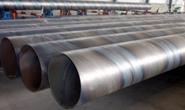Government/Policy

September 2, 2015
USITC Votes to Continue Investigations on Welded Steel Pipe
Written by Sandy Williams
The U.S. International Trade Commission (USITC) today determined that there is a reasonable indication that a U.S. industry is materially injured by reason of imports of heavy walled rectangular welded carbon steel pipes and tubes from Korea, Mexico, and Turkey that are allegedly sold in the United States at less than fair value and allegedly subsidized by the government of Turkey.
The six Commissioners voted unanimously in the affirmative. The Dept. of Commerce will continue its investigations and release its preliminary countervailing duty determination on or about October 14, 2015, and its preliminary antidumping duty determinations on or about December 28, 2015.
The Commission’s public report Heavy Walled Rectangular Welded Carbon Steel Pipes and Tubes from Korea, Mexico, and Turkey (Investigation Nos. 701-TA-539 and 731-TA-1280-1282 (Preliminary), USITC Publication 4563, September 2015) will contain the views of the Commission and information developed during the investigations.







